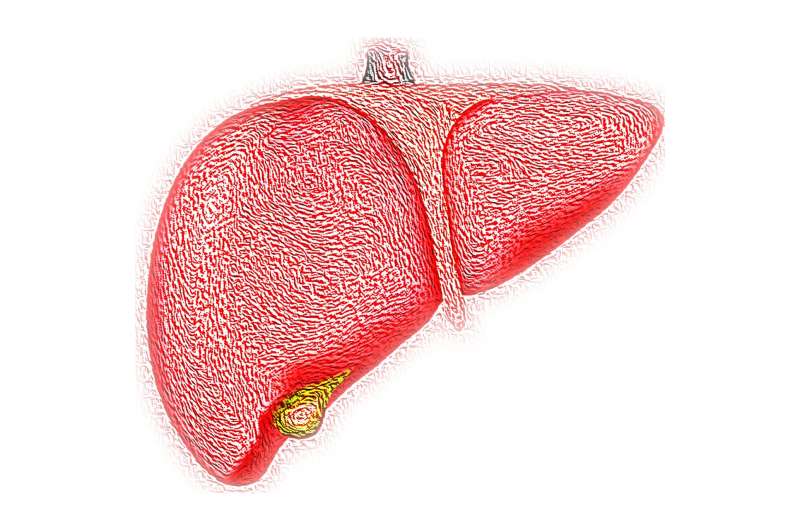This article has been reviewed according to Science X's editorial process and policies. Editors have highlighted the following attributes while ensuring the content's credibility:
fact-checked
peer-reviewed publication
proofread
Trial demonstrates efficacy of gene therapy in patients suffering from Crigler-Najjar syndrome, a rare liver disease

Crigler-Najjar syndrome is characterized by hyperbilirubinemia. If it is not treated quickly, the build-up of bilirubin, due to a deficiency in the enzyme UGT1A1 which is responsible for metabolizing it into a substance that can be eliminated by the body, can cause significant neurological damage and become fatal. At the current time, the only treatment is phototherapy of up to 12 hours per day or a liver transplant.
The results of a European gene therapy clinical trial sponsored by Généthon, involving clinicians from France, Italy and the Netherlands, were published today in the New England Journal of Medicine. The study demonstrates the possibility of restoring expression of liver enzyme UGT1A1 by using gene therapy in cases of Crigler-Najjar syndrome.
The candidate drug medicine designed by Généthon lowered bilirubin levels to below the toxic threshold with a single intravenous injection to such an extent that three patients treated with the highest dose have been able to stop using phototherapy for the last 18 months or more. The clinical trial is currently in the pivotal phase.
Carried out in conjunction with the European consortium CureCN, the objective of this Phase I/II clinical trial is to evaluate the tolerance and efficacy of the candidate gene therapy medicine GNT 0003, which combines an AAV8 vector with a copy of gene UGT1A1, in 17 patients suffering from a severe form of Crigler-Najjar syndrome. The trial started in 2017 in four centers in Europe: France (with Prof. Labrune from Hôpital Béclère in Clamart); Italy (Prof. D'Antiga from Azienda Ospedaliera Papa Giovanni XXIII in Bergamo, and Prof. Brunetti from Pierri-Hôpital Federico II); and the Netherlands (Prof. Beuers from Academic Medical Center in Amsterdam).
The results published today confirm the safety and tolerance for the treatment in all patients (five women aged 21 to 30 years) and sustained efficacy in the three patients treated with the highest dose. The trial demonstrated restored expression of theUGT1A1 gene and a large reduction in bilirubin levels (to 149 μmol/l on average as compared to 351 μmol/l before treatment), which in the three patients treated with the highest dose, has stayed below the toxic level after phototherapy was stopped for 80 weeks or more following treatment. No major side effects have been observed. The only symptoms were changes in hepatic enzymes and headaches which were resolved. This is the first proof of the efficacy of a gene therapy in a metabolic disease of the liver.
The aim of the pivotal part of the study, started last January, is to confirm the observed effect in a larger number of patients including children aged 10 years and over, the age at which the liver matures, and if the results are conclusive to enable a product license application at the French and European authorities. This final stage of development received significant support from the European Medicines Agency (EMA) with a PRIME designation last January.
"Genethon's staff have worked very hard on this project from design to trial and we are very proud of the results which open the way to treating a large number of other metabolic diseases," said Giuseppe Ronzitti, head of Genethon's Liver Disease Immunology and Gene Therapy laboratory.
"We have been involved in the care of patients with Crigler-Najjar disease for more than 30 years. As the PI of this trial, and the oldest physician of this group, I consider these first results to be exciting, encouraging, and even moving. We do hope, and we are confident, that the results of the pivotal part will confirm the efficacy of this gene therapy. Providing a treatment for Crigler-Najjar disease could be the beginning of new adventures for other hepatic metabolic diseases," noted Prof. Labrune.
Dr. Lorenzo D'Antiga added, "We are excited with the first results of this trial. After hemophilia, Crigler-Najjar syndrome is the next liver disease treated by gene therapy. In this trial we managed to restore the synthesis of a non-secreted protein whose deficiency causes severe jaundice in affected patients. We look forward to continuing the next phases of this project and considering also other liver diseases amenable to be cured by our strategy."
"We are most grateful to our participating patients and the whole group of contributors who made these first promising clinical results of our gene therapy trial in Crigler-Najjar Syndrome possible. Piter Bosma in our group started experimental work on this topic 20 years ago. This proves that creativity, dedication and persistence of the whole team may pay off for our patients' well-being," said Prof. Dr. Ulrich Beuers.
"If the results of the pivotal part confirm the efficacy of our gene therapy for Crigler-Najjar syndrome, we will be able to move on to product license application and making the treatment available to patients, providing them with significantly improved quality of life. From basic research to clinical development, Généthon has developed unique expertise with gene therapy for various families of rare diseases. We are very pleased with this new phase which highlights the excellence of the research carried out at Généthon," added Frédéric Revah, CEO of Généthon.
More information: Lorenzo D'Antiga et al, Gene Therapy in Patients with the Crigler–Najjar Syndrome, New England Journal of Medicine (2023). DOI: 10.1056/NEJMoa2214084




















